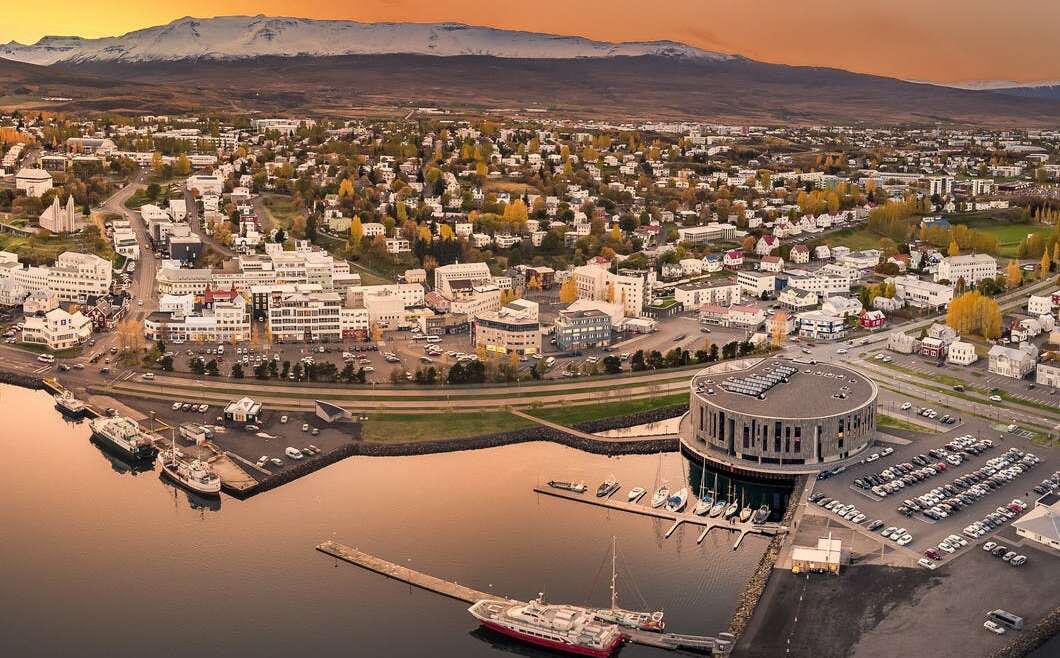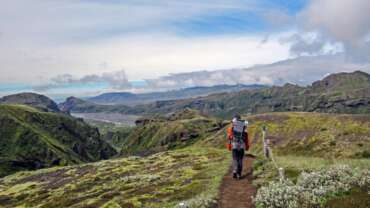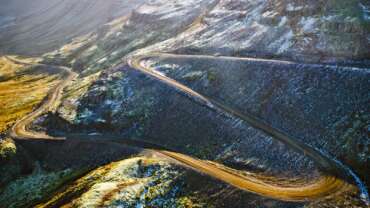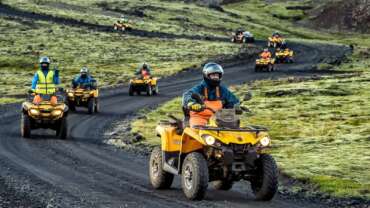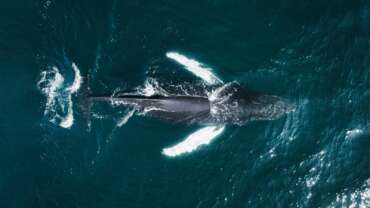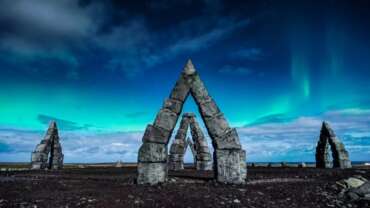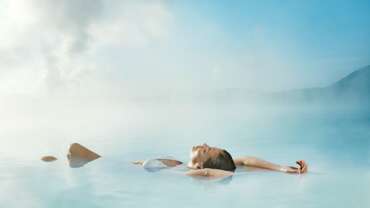Regions of Iceland
ICELAND IS TYPICALLY DIVIDED INTO SEVEN DIFFERENT GEOGRAPHICAL REGIONS, INCLUDING THE REYKJAVÍK CAPITAL AREA. EACH REGION DIFFERS SLIGHTLY WITH RESPECT TO BOTH CULTURE AND LANDSCAPE, BUT ALL ARE UNIQUELY ICELANDIC.
NORTH ICELAND
THE NORTH OF ICELAND TRULY IS A LAND OF CONTRASTS. ITS LONG VALLEYS AND PENINSULAS ARE INTERSPERSED WITH MOUNTAINS, LAVA FIELDS AND SMOOTH HILLS CARVED OUT BY RIVERS. THE DEEP AND NUMEROUS INDENTATIONS IN THE COAST OF THE NORTH ARE AT TIMES LUSH WITH VEGETATION, AT OTHERS BARREN. AS ONE NEARS THE ARCTIC CIRCLE IN THE NORTHERN LATITUDES, THE MIDNIGHT SUN IS INVARIABLY AWE-INSPIRING.
Many towns of the North are dedicated to marine life. The Húsavík Whale Museum and the Seal Center in Hvammstangi are two options for visitors. Close by in the northern reaches of the Vatnajökull National Park is the impressive Ásbyrgi Canyon, as well as the Dettifoss Waterfall—the most powerful in Europe. The nearby Lake Mývatn and its surrounding wetlands has an exceptional variety of waterbirds and rock formations.
The North is home to Iceland’s second largest urban area, Akureyri, located in Iceland’s longest fjord, the mild-weathered Eyjafjörður. Akureyri, rich in culture and history, has a charming downtown full of late nineteenth century wooden houses. In summer, golfers can take advantage of the midnight sun at the Arctic Open. North Iceland is also home to many historic coastal towns.
CLOSE BY IN THE NORTHERN REACHES OF THE VATNAJÖKULL NATIONAL PARK IS THE IMPRESSIVE ÁSBYRGI CANYON, AS WELL AS THE DETTIFOSS WATERFALL—THE MOST POWERFUL IN EUROPE.
TRAVEL THE ARCTIC COAST WAY
Travelling the Arctic Coast Way means leaving the common routes behind you and going off the beaten track to discover some of the most remote places in North Iceland; a unique adventure following 900 km of coastal roads close to the Arctic Circle.
EXPERIENCE THE DIAMOND CIRCLE
The Diamond Circle can be described as a magnificent circuit of 250km in the Northeast of Iceland, which includes some of the most stunning sights and spots for unearthly landscapes.
The Diamond Circle has 5 key destinations which include the historical and picturesque Goðafoss, the unearthly blue and green landscapes of Lake Mývatn nature paradise, the uncontrollable white energy of Dettifoss the most powerful waterfall of Europe, the crescent-shaped wonder of Ásbyrgi canyon and Húsavík the buzzing whale watching capital of Iceland with the deep blue seas ahead.
EAST ICELAND
DISCOVER THE WONDERS OF EAST ICELAND, HOME TO THE COUNTRY’S LARGEST FOREST, LUSH FARMLANDS AND AN ASSORTMENT OF STREAMS AND MOUNTAINS. THANKS TO THE EAST’S FJORDS AND THEIR NATURAL HARBOURS, A VARIETY OF PICTURESQUE FISHING VILLAGES BORDER THE COAST.
There is so much to explore in East Iceland. Iceland’s biggest rhyolite formations directly accessible from an inhabited area are those around Borgarfjörður Eystri, while impressive magma chambers filled with colourful mineral deposits can be seen and visited along the eastern coast. In the summer months, the east of Iceland becomes a creative hub for artists and young people from around Iceland and abroad, as a variety of music and art festivals have been popping up and expanding steadily in recent years.
The hiking and riding possibilities are also numerous, including across extensive but well-mapped uninhabited areas. Winter tourism, for instance skiing or driving on snow, is also important.
Seyðisfjörður is the landing place for the Smyril Line ferry from Europe, and home to a vibrant art scene emerging to the backdrop of a 19th century village. Indeed, the East has a rich artistic history, as the landscape in the region is truly a rich palette. One of Iceland’s most beloved artists, the painter Jóhannes Sveinsson Kjarval, grew up in the town of Borgarfjörður eystri, where he created some of his most memorable work and where a museum now commemorates his life.
The East is also home to several interesting arts and music festival throughout the year. In the southeast, the Vatnajökull Glacier—Europe’s largest—is an imposing, spectacular sight.
ENJOYING EAST ICELAND
Egilsstaðir is the largest town in East Iceland. There are daily flights from the domestic airport in Reykjavík to Egilsstaðir. It is also possible to drive from Reykjavík to Egilsstaðir and also the general Eastern region of the country. In fact, driving to East Iceland provides an exciting opportunity as one can drive through either South Iceland or North Iceland to get to this unique part of the country.
WESTFJORDS
ONE OF ICELAND’S BEST KEPT SECRETS IS UNDOUBTEDLY THE COUNTRY’S NORTH-WEST CORNER, EXPERIENCE THE PEACE AND QUIET OF THE AREA KNOWN AS THE WESTFJORDS.
Isolation has preserved the region in relatively unspoiled wilderness. Largely uninhabited, Iceland’s Westfjords are frequently distinguished by travel guides as a destination of excellence, and are a must-see for any serious explorer.
Hornstrandir are located in the Westfjords’ north-western corner, an uninhabited peninsula and nature reserve that is a haven for the Arctic fox as well as a variety of birdlife. The bird cliff Látrabjarg, on the west side of the Westfjords, which apart from hosting nearly half of the world’s population of some bird species, is also the westernmost point of Europe. The spectacular Dynjandi, a set of waterfalls with an accumulated height of 100 meters, is another must-see.
Tradition and heritage play a large role in the region’s culture. The strong relation to the ocean is evident in the regional cuisine and folklore is as much alive in the Westfjords as anywhere else in Iceland, with museums dedicated to sorcery and witchcraft, as well as monsters and creatures from the sea.
The Westfjords are a true Icelandic wilderness, and are undoubtedly the ideal place for spotting birds, arctic fox, and other unique fauna in their natural habitats.
THE WESTFJORDS ARE A TRUE ICELANDIC WILDERNESS, AND ARE UNDOUBTEDLY THE IDEAL PLACE FOR SPOTTING BIRDS, ARCTIC FOXES AND OTHER UNIQUE FAUNA IN THEIR NATURAL HABITATS.
GETTING THERE
Despite being a remote region of Iceland, the Westfjords are quite accessible. There are two daily flights to Ísafjörður, the Westfjord’s largest town, available all year round. Taking a car is also an option. The distance between Reykjavík and Ísafjörður is 455 km of paved road. Driving allows more flexibility while exploring the region. Please note that all the roads in the Westfjords are not paved, but still drivable and safe, especially by exercising caution. Bus trips are available from Reykjavík to Hólmavík all year and between Hólmavík and Ísafjörður in the summer.
SOUTH ICELAND
ICELAND’S SOUTH COAST IS HOME TO SOME OF THE COUNTRY’S MOST VISITED TOURIST ATTRACTIONS. THE COASTLINE ITSELF IS RENOWNED FOR ITS BEAUTY, AND THE TOWNS ALONG THE COAST ARE FAMOUS FOR THEIR FRESH SEAFOOD.
From wonderful waterfalls, to great glaciers, South Iceland is brimming with natural with new wonders unfolding at every turn. With the Golden Circle route, connecting Þingvellir, Gullfoss and Geysir, South Iceland is a very popular destination for visitors as these three locations have been a must-see for any tourist to Iceland for centuries. Further east along the shore, you will find Skógafoss Waterfall, Jökulsárlón Glacial Lagoon, Vatnajökull Glacier, and several other natural wonders.
The South is rich in history and culture. Events from the Sagas are remembered in many ways along the coast, and several museums in the area celebrate Icelandic customs and heritage. With much of the country’s agricultural products coming from the area, the South is also a fine testimony to Icelandic restaurant culture.
WITH THE GOLDEN CIRCLE ROUTE, CONNECTING ÞINGVELLIR, GULLFOSS AND GEYSIR, SOUTH ICELAND IS A VERY POPULAR DESTINATION FOR VISITORS
GETTING THERE
After only 30 minutes of drive from Reykjavík you will enter the western part of South Iceland where attractions welcome you instantly. Day tours with buses from the city is possible but day tours from various accommodations along the coast is available too. The whole coast, from West to the East has something unique to offer.
REYKJANES
THE REYKJANES PENINSULA IS A GEOTHERMAL WONDER, WHERE LIGHTHOUSES OUTNUMBER VILLAGES. BESIDES HOSTING THE KEFLAVÍK INTERNATIONAL AIRPORT AND, JUST A FEW MINUTES AWAY, THE SPECTACULAR BLUE LAGOON, THE REYKJANES PENINSULA IS A DESTINATION IN ITS OWN RIGHT.
Reykjanes peninsula is replete with natural marvels, in addition to the renowned Blue Lagoon and an array of lighthouses.
As travellers touch down at Keflavik International Airport, visitors are greeted by a moon-like landscape. Unless hidden by snow, a seemingly endless lava field topped with green-grey moss blankets much of the Reykjanes peninsula, and this rather other-worldly sight turns out to be most people’s first glimpse of Iceland, the land of fire and ice.
Reykjanes has several high-temperature geothermal areas, three of which have been harnessed to generate electricity. In the Geothermal Energy Exhibition in the Hellisheiði lava fields, visitors can learn not merely about geothermal power but also local geological history.
On the Reykjanes peninsula the junction between the European and American tectonic plates of the earth’s crust is more noticeable and comprehensible than anywhere else. Thus it is no wonder that the peninsula has now been designated as the Reykjanes Geopark, which besides being a landscape to admire and study is also a veritable hotbed of recreational activities.
Reykjanesbær is the biggest municipality on the Reykjanes peninsula and includes several harbours and villages. The museum Viking World displays a seafaring replica of the famous Gokstad ship and informs the visitor of many aspects of Viking life, in addition to offering splendid views of the Atlantic. The locality takes pride in being the cradle of Icelandic pop and rock music, a genre which can be handily explored at the Museum of Rock ‘n’ Roll.
THE DRAMATIC, RUGGED LANDSCAPE OF REYKJANES FEATURES VOLCANIC CRATERS, CAVES, LAVA FIELDS, GEOTHERMAL WATERS, AND HOT SPRINGS, IN ADDITION TO A VARIETY OF RESTAURANTS, MUSEUMS, CHURCHES, LIGHTHOUSES, AND FESTIVALS.
TAKE YOUR TIME TO ENJOY REYKJANES
For most visitors to Iceland, the Reykjanes peninsula welcomes them as they usually land in Keflavík airport. The endless lava fields, craters and treeless environment is a unique way to be welcomed to the country. The whole Reykjanes Peninsula is a UNESCO Global Geopark, a cultural, geographical and historical treasure trove and as such is worthy of exploration.
WEST ICELAND
WEST ICELAND IS ONE OF ICELAND’S MOST GEOLOGICALLY DIVERSE REGIONS. ITS NATURAL WONDERS ARE A NEARLY EXHAUSTIVE SAMPLING OF ALL THAT ICELAND HAS TO OFFER, RANGING FROM SLUMBERING VOLCANOES AND MAJESTIC WATERFALLS TO A VARIETY OF FLORA AND WILDLIFE.
West Iceland is a world where culture, nature and history complement each other, creating a unique experience. This vast area consists of fjords, valleys, craters, glaciers and volcanoes. Great hikes are found around Akranes and Hvalfjörður, with the mountain Akrafjall and the highest waterfall in Iceland Glymur less than an hour from Reykjavík. Visit the homestead of medieval writer Snorri Sturluson at Reykholt, and see the man-made geothermal bath in which he must have often allowed his mind to wander. Or learn about the awe-inspiring Viking poet Egill Skalla-Grímsson.
These are only a few examples of the interesting sites that can be found all over West Iceland, where nature is inextricably linked to the story of the people. Just look around, history is everywhere to be discovered. The magnificent landscape and wildlife at Snæfellsjökull National Park, Iceland’s only national park that reaches into the sea. The mystical volcano Snæfellsjökull Glacier has inspired artists and poets through the centuries, being one of seven greatest energy centres on Earth. Snæfellsjökull is the setting of Jules Verne’s Journey to the center of the Earth.
Snæfellsnes offers beautiful nature and was given the Earth Check award for being a sustainable community in 2008. From Snæfellsnes you can cross over to Dalir, cradle of the great explorers Eirík the Red and his son, Leif the Lucky, the first European to set foot in America. The short distances between popular destinations make it possible to enjoy the area at a comfortable pace all year round, so remember to slow down in West Iceland.
THIS VAST AREA CONSISTS OF FJORDS, VALLEYS, CRATERS, GLACIERS AND VOLCANOES.
CLOSE TO THE CAPITAL AREA, BUT A COMPLETELY DIFFERENT EXPERIENCE
West Iceland is a relatively short drive from the capital area. It’s possible to go by bus or car with many different routes available to experience West Iceland. The Snæfellsnes peninsula offers an intriguing road-trip where the peninsula can be circled with various stops along the way, including the aforementioned Snæfellsjökull, Kirkjufell in Grundarfjörður, Snæfellsnes National Park, Búðir and many more.
REYKJAVÍK – THE CAPITAL CITY OF ICELAND
REYKJAVÍK IS THE NATURAL STARTING POINT FOR ANY VISIT TO ICELAND, AND NOT UNDESERVEDLY SO. THE CAPITAL IS WORLD-RENOWNED FOR ITS CULTURE, HISTORY, AND NATURAL BEAUTY ON ALL FRONTS.
Downtown Reykjavík is Iceland’s nucleus of Iceland’s culture and arts scene. By day, the café culture rules supreme, with the lively hum of conversations. As evening arrives, people start filling into the city’s excellent restaurants, where local ingredients are served with fresh delicious lamb, seafood or wild game.
Reykjavík is a city of bold contrasts: it is both cosmopolitan and small-town; vibrant and sophisticated; young-at-heart and yet full of history. Many monuments, new and old, are also worth a peek, including the newly built oceanfront music and conference centre, Harpa. Luckily, everything in Reykjavík is close by, museums, galleries, theatres, cafés and swimming pools for example. As such, the city is perhaps best explored by foot or bike.
The pulsing beat of energy and lively events keeps Reykjavík alive and exciting and people are often surprised and impressed at how much culture, art and activities thrive in the city.
But besides being world-renowned for it’s vibrant culture, Reykjavík is truly the gateway to Iceland. The capital area has enough natural wonders at its doorstep to serve as a convenient base for exploring a great deal of spectacular landscape in several directions. From the city, many day trips can also be taken to the surrounding mountains, glaciers, volcanoes and hot springs. Day-excursions from Reykjavík include horseback riding, glacier climbing, river rafting, caving, whale watching, and more.
A NATURAL STARTING POINT
As Keflavík is the main arrival point in Iceland most vehicle traffic from there proceeds to the Reykjavík before heading for other parts of the country. This means there’s a great opportunity to explore both Reykjavík and the capital area as well as the exciting opportunities that wait in the Iceland’s other regions too.



